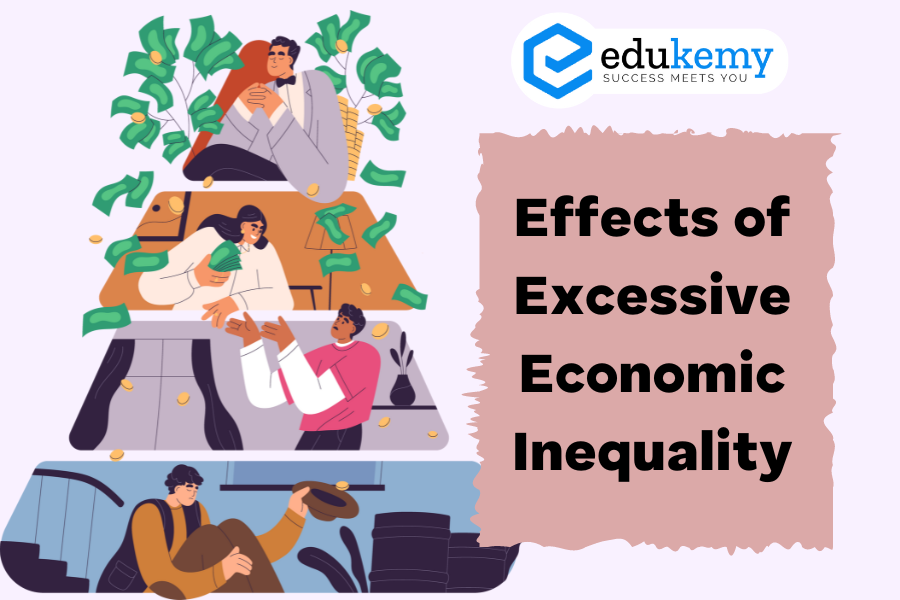
Economic inequality, particularly when it reaches alarming levels, has profound and wide-ranging consequences that permeate various facets of society. Here are key effects:
Contents
- 1 Poverty and Associated Challenges:
- 2 Conclusion:
- 3 FAQs
- 3.1 1. What are the social implications of excessive economic inequality?
- 3.2 2. How does excessive economic inequality impact health outcomes?
- 3.3 3. What are the effects of excessive economic inequality on economic growth?
- 3.4 4. How does excessive economic inequality affect political stability?
- 3.5 5. What measures can be taken to mitigate the effects of excessive economic inequality?
- 4 In case you still have your doubts, contact us on 9811333901.
Poverty and Associated Challenges:
- Widespread Deprivation:
- Inevitably leads to widespread poverty characterized by illiteracy, malnutrition, and inadequate sanitation.
- The majority of the population faces deprivation of basic needs, perpetuating a cycle of poverty.
Human Development Setbacks:
- Resource Limitations:
- Hinders overall human development as the unequal distribution of resources limits access to quality education, healthcare, and essential services.
- Impacts the well-being and potential of a significant portion of the population.
Crony Capitalism:
- Influence Over Policies:
- Excessive economic inequality can lead to the rise of crony capitalism.
- Wealthy individuals and corporations may wield disproportionate influence over government policies, leading to outcomes that favor their interests.
Policy Influence and Social Consequences:
- Wealth-Driven Policies:
- Wealthy entities influencing government policies may result in:
- Low minimum wage.
- Limited or no national health insurance.
- Inadequate spending on health, safety, and environmental regulations.
- Restricted access to essential services.
- Reinforcement of Social Divides:
- Reinforces social fault lines, deepening divisions based on gender, caste, ethnicity, and other factors.
Environmental Dangers:
- Policymaking Biases:
- Lack of bottom-up inputs in policymaking, driven by concentrated wealth and influence, may prioritize growth at any cost.
- Environmental concerns take a back seat as policies favor economic interests over sustainability.
Aggravation of Social Divides:
- Increased Polarization:
- Exacerbates existing fault lines in society, leading to increased polarization along gender, caste, ethnic, and other social divides.
- Social cohesion weakens, potentially leading to increased social unrest.
Challenges to Inclusive Growth:
- Threat to Inclusive Growth:
- Rising inequality poses a threat to inclusive growth, where the benefits of economic development are not shared equitably.
- Widening wealth gaps may hinder opportunities for upward mobility.
Conclusion:
Excessive economic inequality is a multifaceted issue with profound implications for poverty, human development, governance, and environmental sustainability. Addressing these challenges requires comprehensive policies that promote equitable access to resources, opportunities, and essential services for all members of society.
FAQs
Excessive economic inequality can exacerbate social tensions, leading to increased crime rates, reduced social mobility, and heightened polarization. It can create a sense of injustice and marginalization among disadvantaged groups, fostering resentment and mistrust in society.
2. How does excessive economic inequality impact health outcomes?
Economic inequality correlates with disparities in access to healthcare, nutritious food, and safe living environments. Individuals in lower socioeconomic brackets often experience poorer health outcomes, including higher rates of chronic diseases, mental health issues, and reduced life expectancy compared to their wealthier counterparts.
3. What are the effects of excessive economic inequality on economic growth?
Excessive economic inequality can hinder economic growth by limiting opportunities for human capital development and entrepreneurship among disadvantaged groups. It can lead to underinvestment in education and infrastructure, reducing overall productivity and innovation within the economy.
4. How does excessive economic inequality affect political stability?
Economic inequality can erode trust in political institutions and lead to dissatisfaction with the government’s ability to address societal challenges. This discontent may fuel populist movements, political polarization, and instability, potentially undermining democratic principles and governance structures.
5. What measures can be taken to mitigate the effects of excessive economic inequality?
Policy interventions such as progressive taxation, targeted social welfare programs, investment in education and healthcare, and measures to promote inclusive economic growth can help reduce economic inequality. Additionally, fostering an enabling environment for equitable opportunities, fair labor practices, and addressing structural barriers to advancement can contribute to a more balanced distribution of wealth and resources within society.
In case you still have your doubts, contact us on 9811333901.
For UPSC Prelims Resources, Click here
For Daily Updates and Study Material:
Join our Telegram Channel – Edukemy for IAS
- 1. Learn through Videos – here
- 2. Be Exam Ready by Practicing Daily MCQs – here
- 3. Daily Newsletter – Get all your Current Affairs Covered – here
- 4. Mains Answer Writing Practice – here

